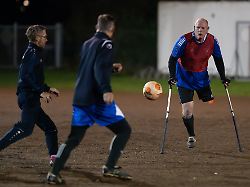Accident, amputation, scoring goals
Para-Kicker puts his foot in the corner and defies all resistance
December 24, 2023, 1:53 p.m
“Pick up the crutches and play football.” That’s Ralf Stellfeld’s motto. The striker was the first footballer with a leg amputee to be granted permission to play in regular league play. How did the district league kicker manage to do that?
The tall striker lurks in front of the goal and gets an assist. He reacts quickly, stretches out his right leg and maneuvers the ball between the two posts. Goal! It’s just an ordinary training game on the gravel pitch of TSV Timmerlah in Braunschweig. But it is still something special: the attacker Ralf Stellfeld has an amputee. While his teammates sprint across the field without restrictions, Stellfeld is the only player who moves across the field with walking aids.
The 43-year-old created a novelty in Germany this year: He received a player pass in the summer, making him the first footballer with an amputated leg to be approved for regular play by the Lower Saxony Football Association. “I didn’t believe it at first,” he said, visibly exhausted after training. “But then I got the information that I would be there at the next home game.”
Stellfeld plays for SG Braunschweig-West, an over-40 team that is made up of three clubs in the region and plays in the district league. There are other footballers with amputees who play for other clubs. But they only take part in training, explained Stellfeld. “In any case, I’m the first one who has the right to play.”
“Nothing for a long time after my accident”
His coach Jan Geppert made contact with the Lower Saxony Football Association and submitted a player pass application. However, it took some time before the player was eligible to play. “It took a while because there were no regulations. Nobody knew exactly what would happen if someone got injured. Nobody knew exactly what the rules of the game were,” says the chairman of TSV Timmerlah, Ulf Wegener. “Then we asked again and again and suddenly the player’s passport was there. Then he could play.”
Stellfeld played football as a child. At the age of 17, he had a serious motorcycle accident on the way to work. He lost his left leg and has been dependent on a prosthesis or crutches ever since.
“Then there was nothing for a long time after my accident,” he said. It took about 20 years before he finally found himself drawn to football again. In 2018, Stellfeld ended up in amputee football with the Sportfreunde Braunschweig. “The first training session was really nasty,” he remembers with a smile. “I couldn’t move for two days. I’ve never had so much muscle soreness in my life.”
Stellfeld still continued training and made it into the Amputee Football Bundesliga for the Nord-Ost syndicate. He has also played for the German national team.
“Slower on three legs than on two”
Because Bundesliga training only took place once a month, he started training at TSV Timmerlah last year. “I came here, everyone was strangers and welcomed me really well,” he reported. “They first had to learn to pass the ball to my right foot rather than my left foot.” The opponents also had to adapt to the new situation: “At the beginning they were more and more hesitant in the duels.”
Stellfeld also scored a goal in a league game. And from a purely regulatory perspective, the crutch counts as an extended arm. If the ball touches the crutch, it is considered a handball. “Of course the bipeds are always faster than me with crutches,” he said. But he tries to compensate for that with good positional play.
His teammates are also happy about the addition to the team: “The interaction with Ralf works very well,” said fellow striker Wegener. “It’s slower on three legs than on two. So we adopted the motto that Ralf stays in front and the others then have to run more.”
For the President of the German Disabled Sports Association, Friedhelm Julius Beucher, this case shows what top sporting achievements people with disabilities are capable of. “Such examples should set a precedent and should perhaps also remove the obstacles that some people and associations have when it comes to admitting players with disabilities into their gaming operations.”
Be a role model for amputees
In athletics, a lot of athletes from the para sports sector trained together with Olympic athletes, said Beucher. They also compete against each other in competitions. The fact that Stellfeld’s case is still unique in football shows that there are still many barriers in people’s minds. “Above all else, the priority must be to make participation possible wherever possible.”
Stellfeld also hopes that he will soon no longer be the only amputee allowed to play in regular games. “I’m happy to have opened this gap in the DFB,” he said. “Perhaps there will now be an impetus that one or two people can join in and there will be more and more of them. I hope that more and more amputees will dare to put their leg in the corner, pick up the crutches and play football to play.”
Stellfeld’s goals for the future are big. He wants to achieve promotion with his team next year. The European Amputee Football Championship will also take place in 2024. “I’m trying to get myself really fit so that I can be there.”
